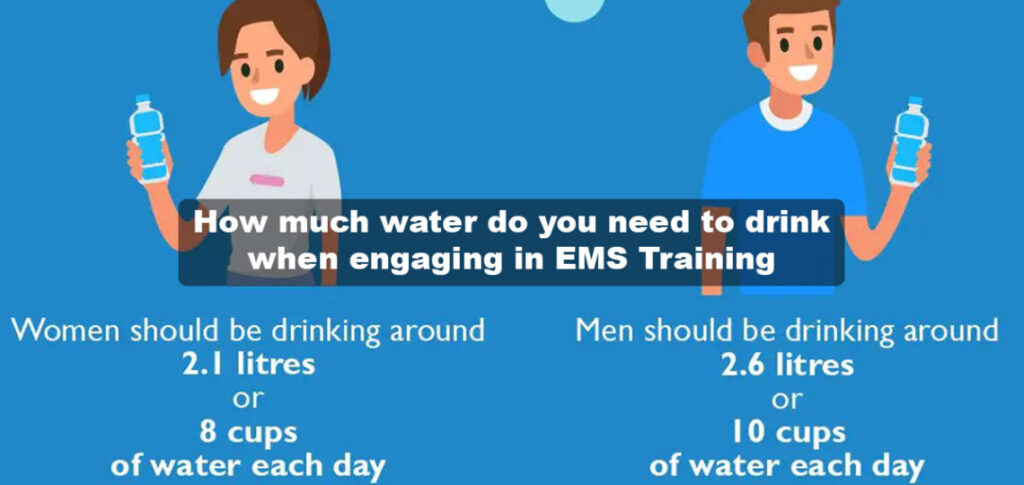-
Table of Contents
- How much water does a person need to drink for effective EMS suit training?
- Introduction
- The Importance of Hydration during EMS Suit Training
- Determining Water Needs for EMS Suit Training
- 1. Body Weight
- 2. Exercise Intensity and Duration
- 3. Environmental Conditions
- Signs of Dehydration during EMS Suit Training
- Tips for Staying Hydrated during EMS Suit Training
- Conclusion
How much water does a person need to drink for effective EMS suit training?
Introduction
EMS (Electrical Muscle Stimulation) suits have gained popularity in recent years as a tool for enhancing athletic performance and improving fitness. These suits use electrical impulses to stimulate muscle contractions, providing a more intense workout experience. However, when engaging in EMS suit training, it is crucial to stay properly hydrated to maximize the benefits and prevent potential health risks. In this article, we will explore the importance of water intake during EMS suit training and provide insights on how much water a person should drink for effective training.
The Importance of Hydration during EMS Suit Training
Hydration plays a vital role in any form of physical activity, and EMS suit training is no exception. When wearing an EMS suit, the electrical impulses cause muscles to contract more forcefully than during traditional exercise. This increased intensity leads to higher body temperature and perspiration, resulting in a higher risk of dehydration.
Proper hydration during EMS suit training offers several benefits:
- Improved performance: Staying hydrated helps maintain optimal muscle function, allowing you to perform at your best during training sessions.
- Enhanced recovery: Adequate hydration supports the body’s ability to repair and recover after intense workouts, reducing the risk of muscle soreness and fatigue.
- Regulated body temperature: Water helps regulate body temperature, preventing overheating during intense EMS suit training sessions.
- Optimized nutrient delivery: Hydration ensures proper blood flow, aiding in the delivery of essential nutrients to muscles.
Determining Water Needs for EMS Suit Training
The amount of water a person needs to drink during EMS suit training depends on various factors, including body weight, exercise intensity, duration, and environmental conditions. The following guidelines can help determine an individual’s water requirements:
1. Body Weight
Body weight is a crucial factor in determining water needs during exercise. As a general rule of thumb, it is recommended to consume 0.5 to 1 ounce of water per pound of body weight per day. For example, a person weighing 150 pounds should aim to drink 75 to 150 ounces (approximately 2.2 to 4.4 liters) of water daily.
2. Exercise Intensity and Duration
The intensity and duration of EMS suit training sessions also impact water requirements. Higher intensity workouts and longer durations result in increased sweating and higher fluid losses. It is essential to replenish these fluids to maintain hydration levels. As a general guideline, consuming an additional 16 to 20 ounces (approximately 473 to 591 milliliters) of water per hour of intense exercise is recommended.
3. Environmental Conditions
The environmental conditions in which EMS suit training takes place can affect fluid needs. Hot and humid environments increase sweating and fluid loss, requiring higher water intake. It is crucial to adjust water consumption accordingly to compensate for these additional losses.
Signs of Dehydration during EMS Suit Training
Recognizing the signs of dehydration is crucial to prevent its negative effects during EMS suit training. Some common signs of dehydration include:
- Thirst
- Dry mouth and throat
- Dark-colored urine
- Headache
- Dizziness or lightheadedness
- Fatigue
- Muscle cramps
If any of these symptoms occur during EMS suit training, it is essential to stop exercising, rehydrate, and rest before continuing.
Tips for Staying Hydrated during EMS Suit Training
Here are some practical tips to help you stay properly hydrated during EMS suit training:
- Drink water before, during, and after your EMS suit training sessions.
- Monitor your urine color. Clear or light-colored urine indicates proper hydration, while dark-colored urine suggests dehydration.
- Consider using a sports drink that contains electrolytes to replenish lost minerals during intense workouts.
- Set reminders to drink water regularly, especially if you tend to forget.
- Carry a water bottle with you during training sessions to ensure easy access to fluids.
- Avoid excessive consumption of caffeinated or alcoholic beverages, as they can contribute to dehydration.
Conclusion
Proper hydration is essential for effective EMS suit training. Staying hydrated improves performance, aids in recovery, regulates body temperature, and optimizes nutrient delivery. The amount of water a person needs to drink during EMS suit training depends on factors such as body weight, exercise intensity, duration, and environmental conditions. By following the guidelines mentioned in this article and recognizing the signs of dehydration, individuals can ensure they stay properly hydrated during their EMS suit training sessions. Remember to listen to your body, drink water regularly, and prioritize your health and well-being to achieve the best results from EMS suit training.




